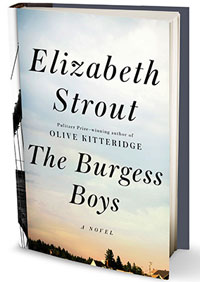Review of Elizabeth Strout’s The Burgess Boys
Pulitzer Winner’s Latest Maine-Based Book Has Its Ups and Downs
Elizabeth Strout’s previous work of fiction, the Pulitzer Prize-winning Olive Kitteridge, was an unlikely success. The protagonist of that collection of interrelated stories, a prickly middle-aged Maine woman, who “had a way about her that was absolutely without apology,” was initially off-putting. However, by the book’s end, she had become such a three-dimensional human being that even if one wasn’t fond of Olive, one couldn’t help but admire her.

Susan Burgess, sister to the “Burgess Boys” in Strout’s new novel, bears more than a passing resemblance to Olive Kitteridge. Like Olive, Susan is a querulous Mainer, although ultimately she and her twin brother, Bob, lack Olive’s gumption. The Burgess Boys have fled their hometown of Shirley Falls for New York, where Bob toils as a “knucklehead” at Legal Aid, while his brother, Jim, shines as a successful defense attorney.
The book’s plot, such as it is, centers on an initially inexplicable action by Susan’s desperately awkward teenage son, Zach. One night Zach throws a pig’s head into a local mosque, and the Somali community that has immigrated to Shirley Falls is naturally outraged. The town’s many liberals rally around the Somalis, and Zach’s crime keeps calling Bob and Jim back to Susan’s cramped, unlovely house in Shirley Falls where they can’t help facing the tragedy that has haunted them since childhood. According to family lore, the twins, 4 years old, were playing in the car when Bob accidently rolled it down the driveway, killing their father. The accident has made Susan cold, Bob oddly sanguine, and Jim infinitely superior to his younger siblings.
Unfortunately for the book, Zach’s trial, which would have made for some interesting courtroom drama, is halted repeatedly by procedural wrangling, and at times The Burgess Boys moves rather slowly. Still, diligent readers will be rewarded by Strout’s carefully crafted sentences, her complex character studies, and her astute meditations on family and home.
Ironically, the person who ultimately seems to understand Zach best is Abdikarim, a Somali elder whose own son was murdered before his eyes in Mogadishu. Zach’s crime is based on an actual incident in Lewiston, Maine, and Strout is clearly fascinated by the way Somali immigrants are replacing people like Bob and Jim, who have left the state for greener economic pastures.
Aside from Abdikarim, perhaps the most sympathetic character is Jim’s wife, Helen, an empty-nester who does her utmost to see the good in each member of the Burgess clan. Less sympathetic is Pam, Bob’s ex-wife and close friend, who turns out to be less loyal than the optimistic Bob had believed.
One night, Pam is lying in bed, imagining how she would narrate the story of her life if she were to run into an old boyfriend: “Well, this, and this, and this have happened. It would not be accurate as told. She thought nothing could be told and be accurate.” Throughout The Burgess Boys, Strout struggles with that very conundrum. How does one translate the ephemera of experience into words? Not easily is the answer provided by this sometimes flawed, sometimes brilliant, yet always insightful novel by one of America’s finest writers.



